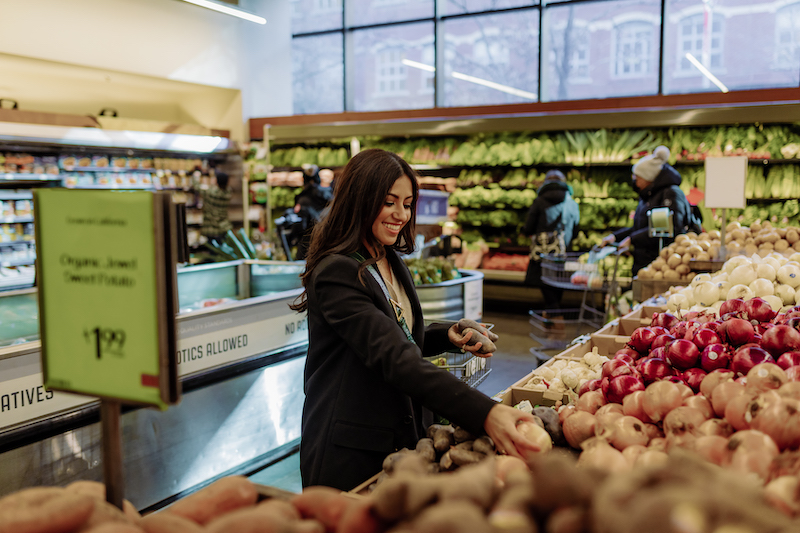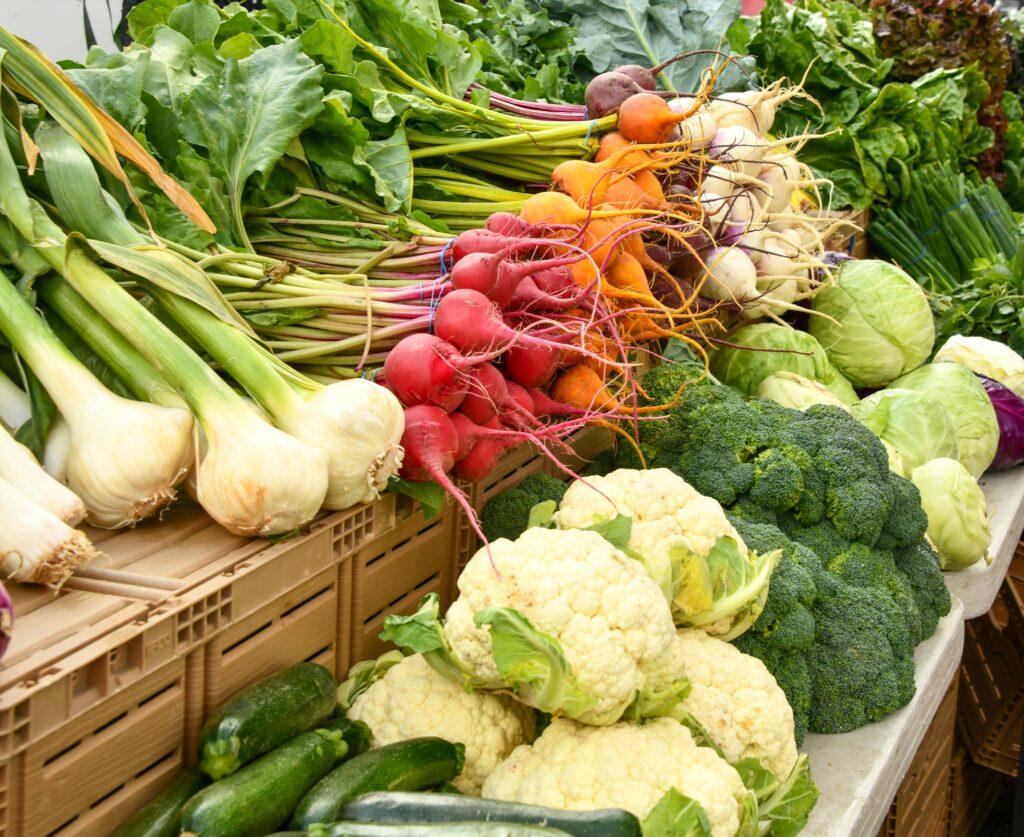
March marks the celebration of National Nutrition Month®, an initiative started by the Academy of Nutrition and Dietetics in 1973. This annual event encourages us to reflect on our food choices and to foster habits that enhance our well-being and physical activity. The theme for 2024, “Beyond the Table,” invites us to broaden our perspective on nutrition. It’s about understanding the journey of food from its origins to our plates and recognizing the variety of settings in which we consume our meals. From appreciating the process of food production and distribution to making informed choices at grocery stores, and even considering our food’s environmental impact, this theme encourages a holistic view of nutrition. It reminds us that making sustainable choices can significantly impact our health and the planet.
“Beyond the Table” challenges us to think about our relationship with food in a comprehensive way. It’s an invitation to look beyond the immediate context of eating and consider the broader implications of our food choices. This theme emphasizes the importance of awareness about how food is produced, where it comes from, and how these factors influence our health and the environment.
Why is this important? Knowledge empowers us to make informed decisions. By understanding the impact of our food choices, we can opt for practices that benefit our health and support environmental sustainability. For example, choosing locally sourced vegetables or reducing food waste are simple actions that contribute to a larger positive effect on our planet.
This theme also acknowledges the diverse circumstances under which we consume food. Whether it’s a quick lunch at the office, a family dinner, or a meal out with friends, each situation offers an opportunity to make mindful choices that align with our health goals and ethical considerations.
Sustainability might seem like a daunting concept, but it boils down to making choices that ensure the long-term health of our planet and ourselves. It involves being conscious of how our eating habits affect the world around us and taking steps, no matter how small, towards more sustainable practices.
In essence, “Beyond the Table” is about connecting the dots between our food, our health, and the environment. It’s a call to engage with our food choices more deeply, understanding their origins, their impact, and the benefits of adopting a more thoughtful approach to eating.
From Farm to Fork – The Journey of Food

This March, “Beyond the Table” gets us thinking about how our food gets from the farm to our fork. It’s all about the steps our food takes, the people who make it happen, and how these steps impact our health and the planet. Knowing more about this can help us make better choices every day.
Sustainable Farming
Our food’s journey begins way before it hits our plates, starting with how it’s grown or raised. Sustainable farming is key here. It focuses on growing food in ways that are good for the environment, make economic sense, and are fair to everyone involved.
This kind of farming tries to keep the soil healthy, save water, cut down on pollution, and not harm the environment. When we pick foods grown like this, we’re supporting a way of farming that can feed everyone now and in the future.
Getting Food to You: How It Travels
After food is picked or made, it needs to get to us. This step involves trucks, trains, and sometimes even planes to move food to stores, markets, and restaurants before it finally gets to our kitchens. How this food gets to us matters a lot. Buying local food helps cut down on the pollution that comes from transporting food long distances and supports local farmers and businesses. Local food is also more nutritious because it has less travel time. Eating the most nutrient dense foods is critical for fertility.
Your Choices Matter
We have a lot of power in what we choose to buy and eat. Going for local, in-season, and sustainably grown food can make us healthier and support your fertility. Shopping at farmers markets or joining a community-supported agriculture (CSA) program are great ways to make these choices since they often don’t spray with pesticides or at least they try to minimize their use. Even if a farm isn’t certified organic, have a conversation with the farmer or vendor to find how they grow their produce. It’s also important to understand what food labels tell us so we can pick products that match our values.
Why It’s Important for Our Health and the Planet
The choices we make about our food—like the farming practices we support and how we shop—really make a difference in our health and the environment. Eating sustainably can mean eating fresher, more nutritious foods while also taking care of our planet’s resources and encouraging a rich variety of plants and animals. Also, by being mindful about not wasting food, we’re helping make sure food is used wisely and not thrown away.
Making Informed Choices at the Grocery Store To Support Fertility

When strolling through the aisles or perusing a farmer’s market, the myriad of choices before us can significantly impact our fertility journey and overall well-being. As a fertility-focused nutrition expert, I understand the crucial role that food plays in optimizing reproductive health. Let’s delve into making informed choices that align with your fertility goals.
Mindful Selection
Amidst the sea of options, it’s essential to prioritize foods that nourish your body and support reproductive health. Opt for nutrient-dense fruits and vegetables, ideally those in season, as they tend to be richer in essential vitamins and minerals vital for fertility. Additionally, choosing locally sourced produce not only supports nearby farmers but also reduces the environmental footprint associated with long-distance transportation, contributing to a healthier ecosystem for future generations.
Understanding Labels and Why It Matters For Fertility
Food labels can tell you a lot. Words like “organic,” “free-range,” or “non-GMO” can give you clues about how the food was grown or made. If you’re not sure what a label means, it might be worth looking it up. Making informed choices gets easier the more you know.
Organic: Organic foods are grown without the use of synthetic pesticides, genetically modified organisms (GMOs), and artificial fertilizers. In livestock, organic means that animals are raised without antibiotics or synthetic growth hormones. They’re also given organic feed and have access to the outdoors. To be labeled as organic in most countries, foods must meet specific government standards.
Purchasing organic foods is critical to reduce the amount of pesticides you are exposed to. Pesticides are an endocrine disruptor and we now know that as the levels of chemicals in a woman’s body increases, fertility has been shown to decrease. In fact, it has been found that women who experienced uterine fibroids, endometriosis, recurrent miscarriages, infertility, and hormonal imbalances, had high levels of chlorinated hydrocarbons, found in pesticides.
Free-Range: Free-range refers to animals, especially poultry, that have been given access to the outdoors, allowing them to move around more freely and exhibit natural behaviors. However, the specific requirements for the amount of outdoor access and how it’s implemented can vary. This label suggests the animals may have a higher welfare standard than those kept in confined spaces.
Non-GMO: Non-GMO means the food does not contain genetically modified organisms. GMOs are plants or animals that have been genetically engineered with DNA from bacteria, viruses, or other plants and animals. Foods labeled as non-GMO have not been produced using these genetic engineering techniques. Gentically modified foods tend to have higher levels of pesticides, including glyphosate.
Natural: The term “natural” is one of the most ambiguous and is not strictly regulated in many cases. Generally, it implies that the product doesn’t contain artificial ingredients or preservatives and is minimally processed. However, the definition can vary, and it doesn’t necessarily mean the product is organic, free-range, or non-GMO.
Pasture Raised: Pasture-raised refers to a method of farming where animals, such as poultry and livestock, are allowed to roam freely outdoors on pasture or range. Unlike conventional farming methods where animals are confined to indoor spaces or small enclosures, pasture-raised animals have access to fresh air, sunlight, and natural vegetation. They are able to engage in natural behaviors like grazing and foraging, leading to healthier, happier animals.
Choosing pasture-raised products can be particularly beneficial for supporting fertility due to several reasons. Firstly, pasture-raised animals typically have a more natural diet rich in grasses and other vegetation, which can result in higher nutrient content in their meat, eggs, and dairy products. These nutrients, including omega-3 fatty acids, vitamins, and minerals, are essential for reproductive health. Secondly, pasture-raised animals are less likely to be exposed to antibiotics, hormones, and synthetic pesticides commonly found in conventional farming, reducing the risk of endocrine disruption and other adverse effects on fertility.
Farmers Markets: A Great Choice To Foster Fertility

Farmers markets are awesome for picking up fresh, local produce. The food here often comes straight from the farm, so it’s about as fresh as you can get. At the farmers market you will find REAL food that will support your fertility and hormones. Plus, shopping at these markets supports local farmers directly, which is great for your community. You can also find unique items you might not see at a regular grocery store.
The Power of Your Dollar
Every time you buy something, you’re choosing the kind of food system you want to support. Buying sustainably grown, local food might cost a bit more sometimes, but it’s an investment in your health and the health of the environment. Think of it as voting for a better food system every time you shop.
Tips for Shopping Smart To Support Fertility
- Make a list before you go to the store or market. This can help you stick to buying what you need and avoid impulse buys.
- Try to fill most of your cart with whole foods. That means lots of fruits, vegetables, whole grains, and lean proteins.
- If you’re on a tight budget, look for deals on frozen or canned fruits and vegetables. Just watch out for added sugars or sodium.
Shopping for food is about more than just filling our pantries; it’s about making choices that reflect our values and goals for health and sustainability. By being mindful of what we buy and where it comes from, we can make a positive impact on our bodies and the world around us.
Final Remarks
This month, let’s embark on a journey of mindful eating, exploring new avenues to savor food that nurtures both our bodies and the planet. Through conscious adjustments to our dietary choices, we wield the power to foster a healthier environment and pave the way for a brighter, more fertile future for ourselves and generations to come.
Remember, every meal is an opportunity to make a positive impact. Let’s celebrate National Nutrition Month® by making choices that go beyond the table, nourishing our bodies, our communities, and our planet.
Whether you’re striving to enhance your fertility journey through nutrition or seeking to embrace a more sustainable lifestyle, I am ready to support you in achieving your aspirations! Take the first step towards a healthier, more fertile future by scheduling a 15-minute discovery call. Together, let’s craft a personalized plan to propel you towards the results you desire.
